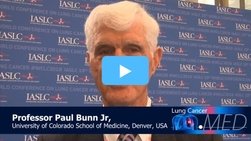Advertisment
WCLC 2018: Accessibility & quality of life: a patient focus at WCLC

Talk of progress in cancer treatment can ring hollow if the new, life-lengthening therapies are not widely available, the president-elect of the European Society of Medical Oncology said here at the IASLC 19th World Conference on Lung Cancer.
By Thomas R Collins / Interview by Esther Drain
Professor Paul Bunn Jr (Denver, USA) and Professor Andrea Bezjak (WCLC co-President, Toronto, Canada) chaired the plenary on ‘Patients First’ and discuss their key take-aways from the session.
“Progress can only happen when high quality is both available and affordable to all patients,” said Professor Solange Peters, who is also head of the thoracic malignancies program at the University of Lausanne.
Putting “patients first” was a dominant theme at the WCLC, which also included a talk on the need for greater attention on patients’ quality of life.
Many cancer drugs are “almost unaffordable,” Professor Peters said. Their cost has jumped by 72% in the U.S. and by 50% in countries outside the U.S. since 2010.
While most targeted therapies are available at little or no cost in most western European countries, availability of treatments beyond the ALK-inhibitor crizotinib comes only at a high cost in some countries, including Turkey, Israel and Cyprus. In the poorest nations in the world, Professor Peters noted, even basic chemotherapy treatment is unavailable.
The disparity is borne out in outcomes in Europe, she said.
“Despite much higher incidence rate of cancer in western Europe, more patients are dying from cancer in central and eastern Europe,” she said.
She encouraged wider use of clinical benefit scales — a systematic ranking of everything done in cancer treatment, meant to be a validated and reproducible tool to assess the magnitude of clinical benefit of anti-cancer medications, and to highlight treatments that bring big benefit compared to those with modest benefit. More attention to this benefit would, ideally, lead to more appropriate pricing.
As it is, she said, “depending on the magnitude of benefit, you will not see any benefit in how expensive (a drug can become) on the market.”
The approval of less-expensive biosimilars, with more such approvals expected as monoclonal antibodies come off patent, should also help expand availability and accessibility of cancer treatment.
Academic and government-funded research is also crucial to addressing the problem. Globally, 65% of trials are now funded by health systems, government, universities and other research organizations.
“The number is going down every year and we really have to fight to make sure that the right questions are answered for all of our patients in the future,” she said.
Dr Jesme Fox (Roy Castle Lung Cancer Foundation, UK) gives highlights from her presentation on access to innovation and the role of patient voice.
In another session, Professor Richard Gralla from Albert Einstein College of Medicine, said quality-of-life measures need to figure more prominently in clinical trials, especially since symptom distress, symptom interference with activities and health-related quality of life — the 3-Item Global Index categories — can help identify patients at risk of worse outcomes and can help assess how effective a treatment is.
“We miss valuable information for patient management and for clinical trials when (we are) not using available and practical assessment measures,” he said. “Current quality of life and patient-reported outcome measures can take as little as 2 minutes to complete, using electronic assistance, and can be very inexpensive.”





